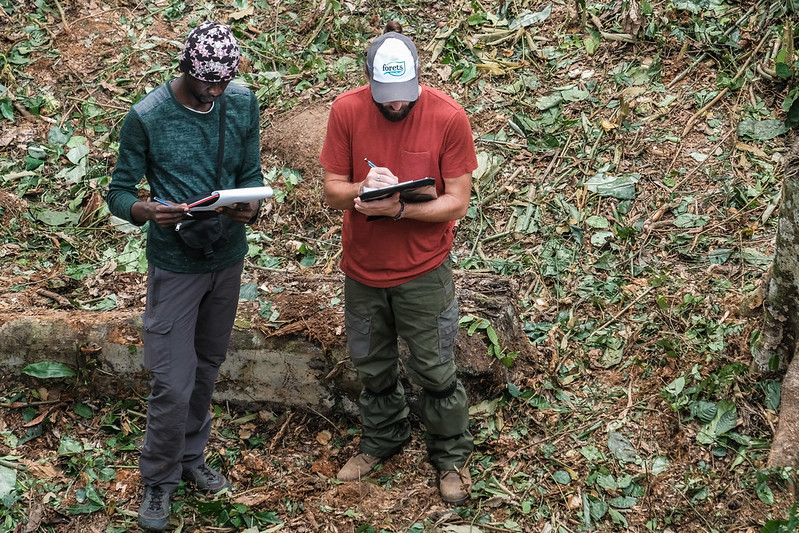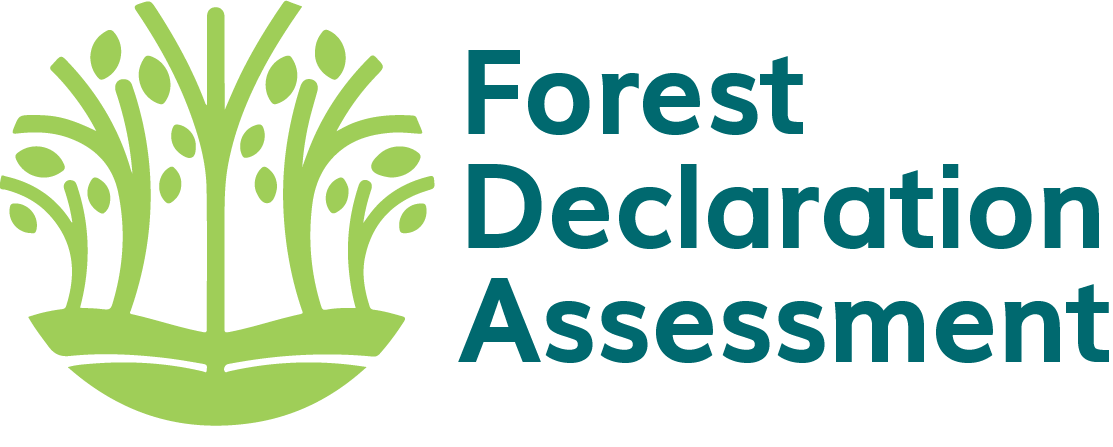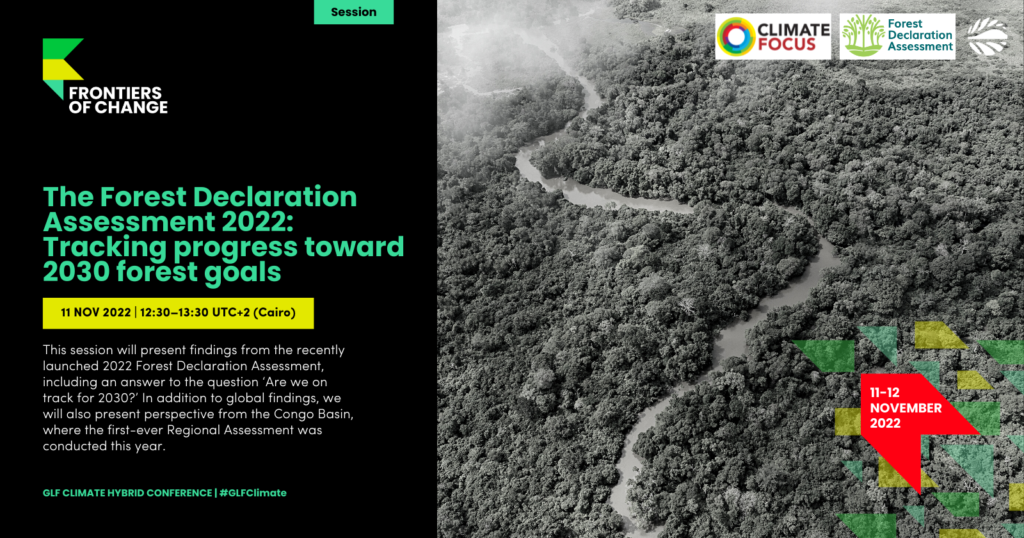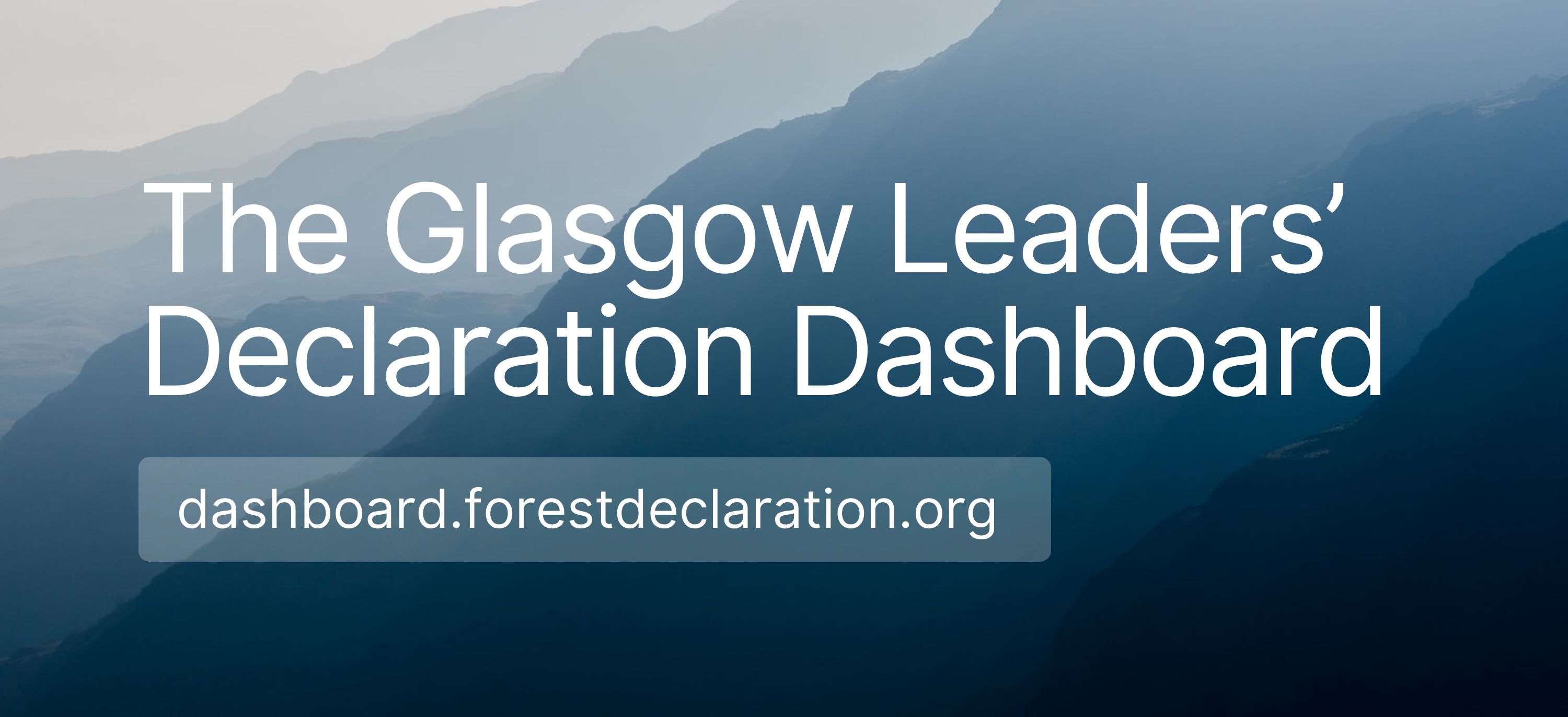At the Global Landscapes Forum (GLF) Climate conference, held in parallel to COP27, the Forest Declaration Assessment invited assessment partners to discuss the role of civil society in holding decision-makers accountable to forest pledges and driving progress towards global and regional forest goals.
The session "Tracking progress on policy action to achieve 2030 forest goals” featured key findings from the 2022 Global and Regional Assessment reports and an expert panel that underscored the importance of civil society for meeting forest goals.
Event moderator Hermine Kleymann (Forest Policy Lead, WWF International) framed the event by offering both worrying and encouraging developments on forests trends. Despite not being at the top of the agenda at COP27 in Sharm-El-Sheikh, forests received a fair share of attention. The first week of COP27 saw the launch of the Forest and Climate Leaders’ Partnership (FCLP), progress reporting on forest finance pledges from COP26, and new funding commitments (e.g. an additional EUR 1 billion from Germany, USD 2 billion in blended finance for restoration in Africa) and initiatives (e.g. the Forests, People, Climate philanthropic initiative). These initiatives launched as global forests – from the Amazon to the Congo Basin – are woefully off track to meet the 2030 goal of halting and reversing deforestation.
The first-ever Regional Forest Declaration Assessment was conducted in 2022 in the Congo Basin, coordinated by Climate Focus and supported by a network of civil society organizations based in the Congo Basin. Despite decreasing deforestation trends in previous years, the assessment highlighted that 2021 saw an increase in deforestation, potentially driven by a complex web of small- and large-scale drivers. Industrial activities such as mining and forestry in particular pose the greatest risks for central intact forests. Monitoring the impact of these large-scale activities will be particularly important to assess future deforestation risks and impacts. While countries in the region have put in place important policies to tackle deforestation and strengthen land tenure security, improvements are still needed to align policies with forest objectives. Strengthening the rights of local actors and their participation in forest governance can improve results in this area, said Marion Ferrat (Senior Consultant, Climate Focus).
1. Land tenure security: How civil society supports this fundamental prerequisite to the 2030 forest goals
Patrick Kipalu (Africa Program Director, Rights and Resources Initiative) stressed that land tenure security in Africa is a “fundamental prerequisite” to achieving sustainable and equitable outcomes. Communities with secure land-tenure rights face less risk of dispossession, which facilitates traditional forest management and results in lower rates of deforestation, better carbon sequestration and biodiversity, and more livelihoods supported compared to lands managed by government or private entities, according to Kipalu. He also noted that currently only 10 to 15% of customary lands owned by Indigenous Peoples (IP) and Local Communities (LC) in Africa is legally recognized.
Civil society organizations are crucial in holding governments accountable in the effort to establish and protect land tenure security, Kipalu suggested. Due to origins in or involvement with local communities, civil society organizations better understand community dynamics. Civil society organizations, Kipalu noted, also play a critical role in community capacity building, data collection, and exerting pressure on the government – all essential tasks in ensuring appropriate land tenure security for IPs and LCs.

2. Participatory and inclusive forest management and decision-making: How civil society can bring women and communities into the halls of power
While women play an essential role in poverty reduction and forest management in Central Africa as food and income providers to their families, much progress remains in ensuring gender parity in the region. Monique Yigdebek (Regional Coordinator, REFADD) noted that civil society actors can support the role of women in forest decisions in Central Africa through advocacy at all levels of representation, and by mainstreaming gender parity issues within policymaking. At the same time, women must also be represented within civil society organizations themselves, Yigdebek noted.
Echoing the important role of IPs and LCs in the preservation of forests, Elvis MVE (Legal Project Manager, Brainforest Gabon) discussed how participatory forestry empowers communities to personally control and sustainably manage land. Brainforest Gabon, alongside similar organizations, helps identify legal gaps and weaknesses to lower the barriers to participatory forestry and amplify marginalized voices in the Congo Basin.
3. Forest finance: How civil society drives accountability and execution of commitments
Forest finance is a foremost component of driving real forest progress. In an encouraging trend towards transparency on forest finance pledges, endorsers of each of the Global Forest Finance Pledge (GFFP), the Congo Basin Pledge, and the Indigenous Peoples (IPs) and local communities (LCs) Forest Tenure Pledge released reports detailing their progress on implementation. The GFFP disclosed that they were on track to meet their 2021-2025 funding target, and the Congo Basin Pledge noted that 34% of the USD 1.5 billion committed to the Congo Basin over five years was reported as being spent. The annual report from the IPs and LCs Forest Tenure Pledge noted that 19% of the total USD 1.7 billion for IPs and LCs’ forest tenure was spent in 2021, with just 7% of this funding going to IP- and LC-led organizations.
On a global level, Global Canopy recently launched the Deforestation Action Tracker, which holds accountable institutions with net zero targets in order to increase transparency and accountability, explained Emma Thomson (Forest 500 lead, Global Canopy). Such work exemplifies the crucial role of civil society towards increasing knowledge, awareness, and accountability in forest work.
Future directions: Outlook for forest pledge in the Congo Basin and around the world
In the Congo Basin and globally, progress reporting remains an essential component to meeting 2030 forest goals. In light of this, the November 7th launch of the FCLP at COP27 is a welcome advancement in reporting accountability. Convening annually to drive progress towards global forest and climate goals, countries within the FCLP commit to leading on at least one of the FCLP’s action areas. The Assessment welcomes the demonstration of follow-through and accountability by global leaders to make real progress on forest goals. At the same time, civil society must continue to create space for and amplify the voices of unheard and marginalized groups in forest decision-making, while building knowledge and understanding of how endorsers are implementing their forest pledges.
Read the global Forest Declaration Assessment 2022 here: "Forest Declaration Assessment: Are we on track for 2030?"
Read the Regional Assessment 2022 here: "Regional Assessment 2022: Tracking progress towards forest goals in the Congo Basin"



